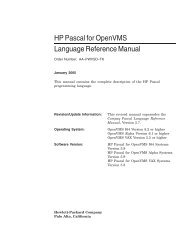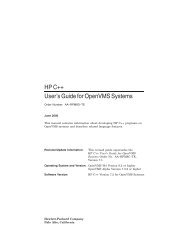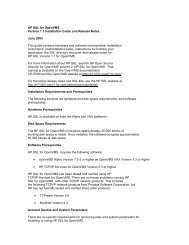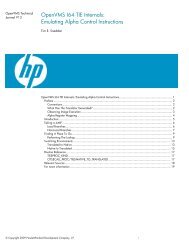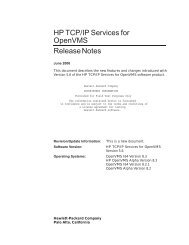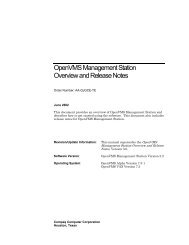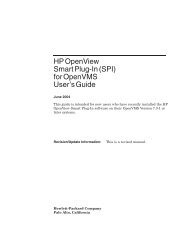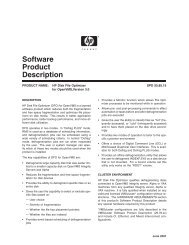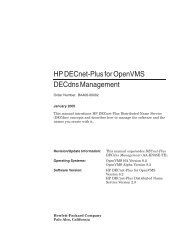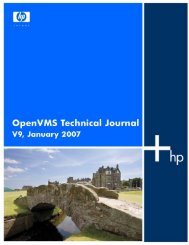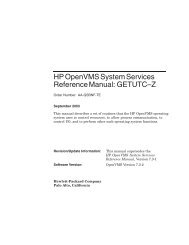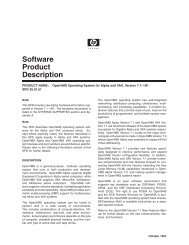HP Archive Backup System for OpenVMS Guide to Operations
HP Archive Backup System for OpenVMS Guide to Operations
HP Archive Backup System for OpenVMS Guide to Operations
Create successful ePaper yourself
Turn your PDF publications into a flip-book with our unique Google optimized e-Paper software.
Saving and Res<strong>to</strong>ring Data<br />
3.5 Saves and Res<strong>to</strong>res<br />
• Defining the date and time <strong>to</strong> be used as a basis <strong>for</strong> scheduling - all scheduling intervals are<br />
based on both the date portion and time portion of the base date, and anniversaries of the<br />
base date at intervals defined by the frequency attribute.<br />
• Defining the basis <strong>for</strong> full versus incremental saves <strong>for</strong> complex frequencies such as dailyfull-weekly,<br />
log_2 and log_3. The base date and appropriate anniversaries of the base date<br />
define the date of the full saves.<br />
Unless you want <strong>to</strong> change the scheduling or save type basis <strong>for</strong> the request, you would not<br />
change the base date. As such, the base date will remain a date in the past. Compare this <strong>to</strong> the<br />
start date, which specifies the next start date and time <strong>for</strong> the request. The start date is updated<br />
whenever the request is run <strong>to</strong> reflect the next time it is scheduled, or NONE if it is not scheduled<br />
again.<br />
When a request is first created, and you specify only one of the dates, both dates are set (i.e. the<br />
next start date is the base date). By default, neither a base date or start date are supplied so the<br />
request is not scheduled <strong>for</strong> execution.<br />
You can use the start date and skip time <strong>to</strong> request a one-time special, or non-scheduled, execution<br />
of the request. For example, assume that the normal scheduled time <strong>for</strong> a request is 23:00, as<br />
specified in the base date. However, you know that this is a particularly busy night and you want<br />
<strong>to</strong> start this request <strong>for</strong> <strong>to</strong>night only at 21:00 instead. You can do this by setting the start date <strong>to</strong><br />
21:00. However, when the request is rescheduled, it will be rescheduled <strong>to</strong> the next iteration of<br />
the base date, or 23:00 the same day. You probably do not want this, so <strong>to</strong> avoid it you can set the<br />
start date <strong>to</strong>gether with a skip time <strong>to</strong> avoid running the request twice. The skip time is an exclusion<br />
time (expressed as a delta time) from the specified start date in which the request will not be<br />
rescheduled: normally you can set this <strong>to</strong> one day <strong>to</strong> avoid running the request twice in the same<br />
day. The following table shows some examples of base date, start date and skip time definitions<br />
based on a daily frequency:<br />
Table 3–2 Use of Base Date, Start Date and Skip Time<br />
Base Date Start Date Skip Time Next Start<br />
23-Aug 23:00 10-Sep 21:00 None 10-Sep 23:00<br />
23-Aug 23:00 10-Sep 21:00 1-00:00:00 11-Sep 23:00<br />
23-Aug-23:00 10-Sep-23:00 2-00:00:00 12-Sep 23:00<br />
When you specify a skip time, ABS saves it in the database until the request is next rescheduled.<br />
When the rescheduling takes place, the skip time is applied <strong>to</strong> the calculation, then cleared from<br />
the database. If you set a skip time and do not see it in the request, then it has already been<br />
applied <strong>to</strong> the next start date.<br />
3.5.4 Be<strong>for</strong>e Date, Since Date and Date <strong>Archive</strong>d (Res<strong>to</strong>re Only)<br />
When res<strong>to</strong>ring files, you can choose a specific iteration of the files based on their archive date -<br />
that is, the date that they were saved in the archive. If you know the exact date archived, use the<br />
data archived attribute. If you know only an approximate date archived, use the be<strong>for</strong>e or since<br />
attributes <strong>to</strong> specify a range of dates. So, <strong>for</strong> example, if you wish <strong>to</strong> res<strong>to</strong>re a file as it existed in<br />
the first week of January, you can specify a be<strong>for</strong>e date of the 8th January (at midnight), or a<br />
since date of 1st January (at midnight). When determining appropriate be<strong>for</strong>e or since dates, you<br />
should probably lookup the files in the catalog be<strong>for</strong>e requesting a res<strong>to</strong>re, so that you can specify<br />
be<strong>for</strong>e and since dates that uniquely identify a single iteration of the file <strong>to</strong> res<strong>to</strong>re.<br />
3-18 Saving and Res<strong>to</strong>ring Data



